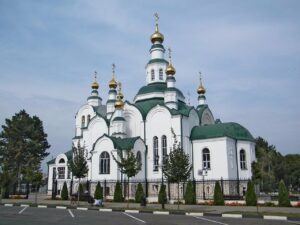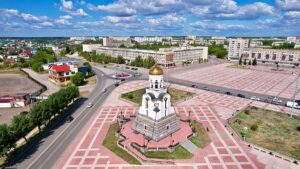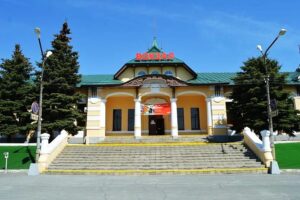Fraser Island: Australia’s Natural Wonder of Sand, Sea, and Forest

Nestled off the eastern coast of Queensland, Australia, lies the spectacular Fraser Island – a pristine paradise renowned for its stunning natural beauty, unique ecosystems, and rich cultural heritage. Stretching over 123 kilometers (76 miles) in length, Fraser Island is the largest sand island in the world and a UNESCO World Heritage-listed site that attracts travelers from far and wide seeking to immerse themselves in its awe-inspiring landscapes and diverse array of experiences.
Geological Marvel:
Fraser Island’s most striking feature is its immense sand dunes, which rise to heights of up to 240 meters (787 feet) above sea level, making them some of the tallest sand dunes in the world. Formed over millions of years through the accumulation of sand deposited by ocean currents, Fraser Island’s unique geology has created a mosaic of habitats, including towering dunes, lush rainforests, crystal-clear lakes, and mangrove swamps.
One of the island’s most iconic landmarks is Lake McKenzie, a pristine freshwater lake renowned for its crystal-clear waters, pure silica sand beaches, and vibrant turquoise hues. Visitors can swim, sunbathe, and relax on the shores of this natural wonder, surrounded by the tranquil beauty of the island’s interior.
Rich Biodiversity:
Despite its seemingly inhospitable environment, Fraser Island is home to a surprisingly diverse array of plant and animal species, many of which are found nowhere else on Earth. The island’s rainforests are teeming with life, with towering eucalyptus trees, ancient ferns, and colorful wildflowers providing habitat for an abundance of wildlife, including dingoes, wallabies, possums, and over 300 species of birds.
Fraser Island’s coastal ecosystems are equally rich in biodiversity, with mangrove forests, saltmarshes, and seagrass meadows providing vital habitat for marine life, including dolphins, dugongs, turtles, and migratory shorebirds. The island’s waters are also home to a diverse array of fish species, making it a popular destination for fishing, snorkeling, and diving enthusiasts.
Cultural Heritage:
Fraser Island holds deep cultural significance for the Indigenous Butchulla people, who have inhabited the region for thousands of years and continue to maintain a strong connection to the land and sea. The Butchulla people have a rich oral tradition of Dreamtime stories and cultural practices that are passed down through generations, providing valuable insights into their spiritual beliefs, customs, and relationship with the natural world.
Visitors to Fraser Island can learn about the island’s Indigenous heritage through guided cultural tours led by Butchulla guides, who share their knowledge of traditional hunting and gathering techniques, bush tucker, and medicinal plants. These experiences offer a unique opportunity to gain a deeper understanding of the island’s cultural significance and the importance of preserving its Indigenous heritage for future generations.
Adventure and Recreation:
Fraser Island offers endless opportunities for adventure and recreation, with a wide range of activities to suit every interest and skill level. Outdoor enthusiasts can explore the island’s network of hiking trails, including the iconic Fraser Island Great Walk, which winds its way through lush rainforests, sandy beaches, and scenic lookouts.
For those seeking a thrill, Fraser Island is a paradise for 4WD enthusiasts, with miles of sandy tracks and challenging terrain to conquer. Popular 4WD destinations include the rugged tracks of the Eastern Beach, the towering sand dunes of the Hammerstone Sandblow, and the rocky headlands of Indian Head, which offer panoramic views of the surrounding coastline and opportunities for whale watching during the migration season.
Environmental Conservation:
Preserving the natural beauty and ecological integrity of Fraser Island is of paramount importance, and extensive conservation efforts are underway to protect its fragile ecosystems and biodiversity. Park management works closely with Indigenous rangers, conservation organizations, and volunteers to implement strategies for managing invasive species, controlling erosion, and minimizing the impact of human activity on the island’s environment.
Visitors are encouraged to practice responsible tourism by following designated trails, respecting wildlife and natural habitats, and minimizing their environmental footprint. By working together to protect and preserve Fraser Island, we can ensure that future generations will continue to be inspired by its timeless beauty and natural splendor.
Conclusion:
In conclusion, Fraser Island is a true natural wonder – a pristine paradise of sand, sea, and forest that captivates the imagination and offers endless opportunities for exploration and adventure. Whether you’re swimming in the crystal-clear waters of Lake McKenzie, hiking through ancient rainforests, or exploring the island’s rugged coastline, Fraser Island promises an unforgettable experience that will leave a lasting impression on all who visit. So, pack your bags, lace up your hiking boots, and embark on a journey of discovery into the timeless beauty of Fraser Island.




